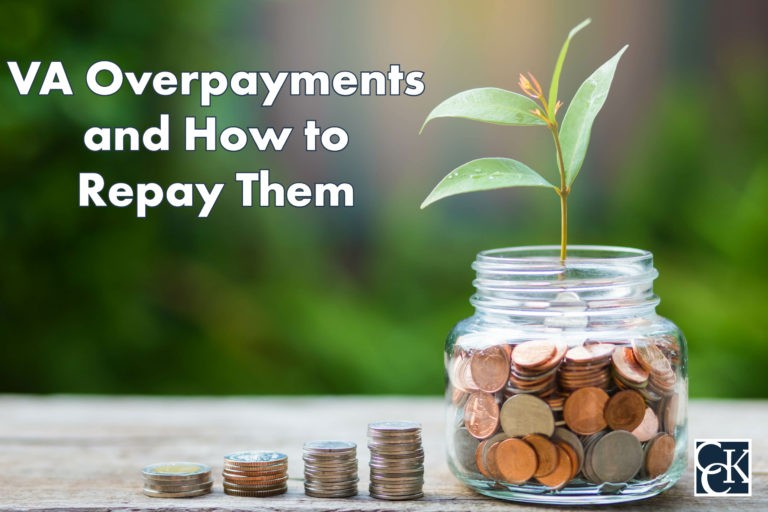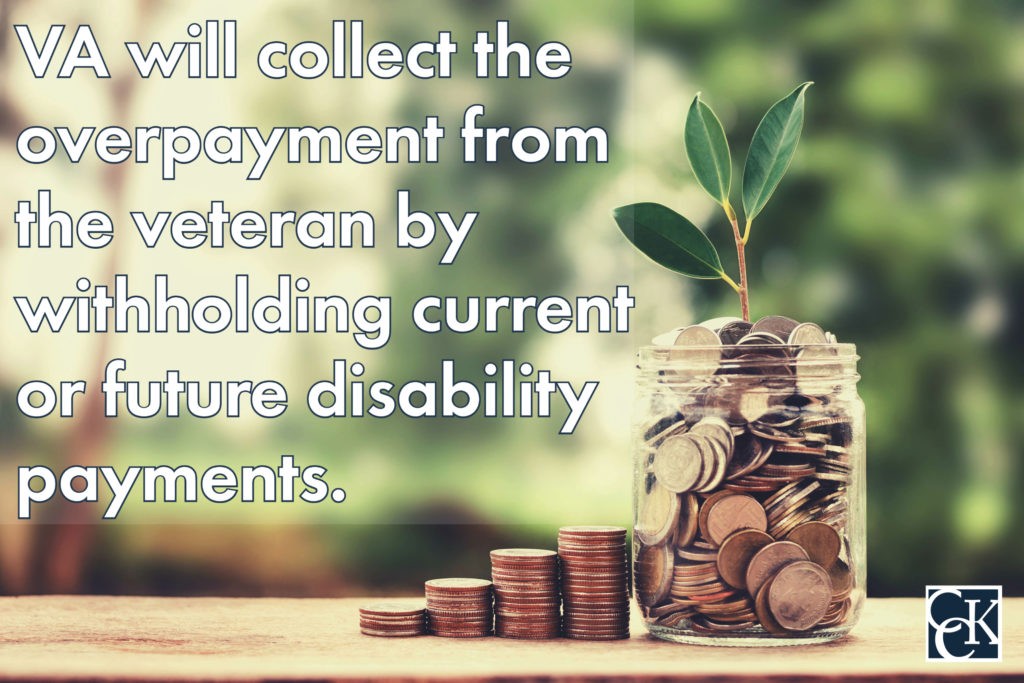VA Overpayments and How to Repay Them

CCK Law: Our Vital Role in Veterans Law
When the United States Department of Veterans Affairs (VA) overpays a veteran and must pay the extra money back, this is called a VA overpayment.
What is a VA Overpayment?
An overpayment is a debt VA creates when it determines a veteran has been paid more than they were entitled in benefits. Essentially, the veteran receives more than their designated disability benefit or other VA benefit amount.
How Does VA Collect an Overpayment?
When VA creates an overpayment, they will issue an overpayment notice to the veteran with the total overpayment amount and request that it be repaid. The written notice must include:
- The exact amount of money that must be paid;
- A clear explanation for why the overpayment occurred;
- Instructions on how to repay the VA overpayment; and
- Information on how to dispute the overpayment.
The veteran must then return the money within 30 days of being notified by VA. If they do not, VA will recoup, or recover, the debt from the veteran by withholding current or future disability payments.
What Are Common Reasons for a VA Overpayment?
VA overpayments may occur for a variety of reasons, depending on the nature of the benefits in question. A few common reasons for VA overpayments include:
- A VA dependent overpayment due to changes in dependency status (e.g., when a veteran fails to notify VA of their divorce and continues to receive benefits for their spouse);
- VA pension recipients failing to report income;
- Changes in enrollment in educational programs (e.g., GI Bill overpayment); and
- Failure to report a period of incarceration to VA.
Sometimes VA just mistakenly believes an overpayment has occurred. In these situations, it is important to dispute the VA overpayment.
What Can I Do to Fight a VA Overpayment?
If you believe an overpayment was created by mistake or are unable to repay the overpayment, you can take certain actions in response. These include:
- Disputing the existence and/or the amount of the debt;
- Requesting a VA overpayment waiver form;
- Requesting a hearing for the waiver;
- Submitting a compromise offer with a financial status report; or
- If VA denies the dispute or initial waiver request, you can appeal the denial.
Disputing the VA Overpayment or Amount of Debt
If the veteran wishes to challenge the amount or the existence of the debt, they must file a dispute. While veterans can dispute the overpayment at any time, a dispute must be submitted within 30 days of the VA notice to delay the collection of debt.
VA is then required to review the accuracy of the debt determination. If VA decides that the overpayment is indeed correct, the veteran can still request an overpayment waiver.
Submitting a VA Overpayment Waiver Form
A veteran can request a VA overpayment waiver within 180 days from the date of VA’s overpayment notice. If the waiver is requested within 30 days of the notice, VA should stay its collection of the debt until the request is resolved.
Veterans should include a financial status report to show how the recoupment of debt would cause them financial hardship. When evaluating the veteran’s waiver request, VA considers if the veteran misled them in any way, if VA is at fault, or if the veteran is experiencing undue hardship and is unable to repay the overpayment. However, VA cannot waive the overpayment if there is fraud, misrepresentation, or bad faith on the part of the veteran.
If the veteran believes that the overpayment was created through the fault of VA, they can argue the overpayment be waived. If it is found that the debt was created based solely on VA administrative error or error in judgement, the veteran may be able to keep the excess payments.
Requesting a Hearing for the Waiver
Veterans have the right to request a hearing in order to explain why they disagree with the overpayment and need a cancellation of debt. If they request a hearing within 30 days of the overpayment notice, VA is not allowed to issue a decision on the waiver until the hearing is held.
Offering to Compromise with VA
A veteran may also decide to submit a compromise offer to VA. If a veteran cannot pay back the debt in full or within a reasonable timeframe, they can suggest a lesser amount of money in place of the full debt.
When filing for a compromise offer, veterans should specify the amount of money they are willing to pay. They should also include write a letter explaining why they are requesting a compromise and a financial status report.
What if the VA Overpayment Is Legitimate?
If VA proves that the debt is valid, veterans can set up a payment plan with VA’s Debt Management Center (DMC). The DMC manages all overpayments and will be responsible for recouping the debt from the veteran.
Appealing a VA Denial of Your Dispute
If VA denies your dispute, you can appeal the decision by filing a Notice of Disagreement. Although VA will no longer stay its collection of debt, your withheld benefits will be restored if you win on appeal.
If your VA disability claim has been denied, the experienced veterans’ disability attorneys at Chisholm Chisholm & Kilpatrick may be able to help. Contact us today at 800-544-9144.
About the Author
Share this Post

